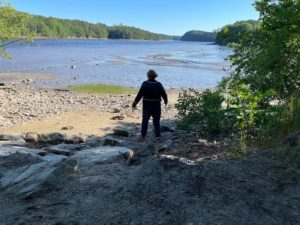Whose Footsteps Do We Remember
 Footsteps Before Mine
Footsteps Before Mine
Suppose for a moment that the ground beneath us can remember. That every footstep leaves not just an imprint in the soil but a whisper in time.
November, the month of remembering, invites that kind of listening.
In the United States, it is both Native American Heritage Month and Thanksgiving—two observances that share the same calendar space but not always the same heart. They both call us to awareness as well as gratitude.
I find myself somewhere between the two, holding both truths in my hands: gratitude for all that sustains me, and humility for how little I have understood of the stories that came before mine.
Remember the earth…
I live on unceded Wabanaki land—homeland of the Penobscot, Passamaquoddy, Maliseet, and Mi’kmaq peoples.
For much of my life, I did not know that. I thought history began with the European settlers, as if the more than 10,000 years before had been a blank page.
But this land has never been blank.
When I walk the paths behind my home, the mosses, stones, and Penobscot River each tell stories I can almost hear if I’m quiet long enough.
Former U.S. Poet Laureate Joy Harjo (Muscogee Creek) offers this reminder:
“Remember the earth whose skin you are:
red earth, black earth, yellow earth, white earth.”
— from Remember
(poets.org/poem/remember-0)
Her words feel less like advice than an invitation—to remember myself as part of earth’s body rather than its owner.
In response, I wrote the following poem…
Whose Footsteps Before Mine
The wind carries names
I cannot speak—
echo of birch, of river,
of foot on glacial stone.
I walk soft, asking forgiveness
for every ignorant step,
for the maps I learned
that erased their silence.
Under these skies, I breathe
a prayer:
may I open my palms and ears,
learn the old story of place
told in moss, in bone, in water.
May the land remember me kindly—
not as a newcomer claiming,
but a guest seeking blessing,
a penitent with words,
offering respect in small acts:
listening, unlearning, holding space.
Whose footprints before mine
traced trails in snow and shade,
whose voice still hums beneath leaf and thorn—
let me stand lightly,
let me learn to pass your way
with gratitude, not erasure.
Writing this felt like kneeling. Each line an apology, each pause a breath of awe. I cannot rewrite the past, but I can honor it by remembering that I stand on borrowed ground.
Water, Memory, and Return
Another Indigenous poet who speaks to this remembering is Mihku Paul (Maliseet/Waponahki), who grew up in Maine. Her poem The Water Road maps ancestral presence along the Penobscot River and the lakes that feed it.
She writes:
“Where tributaries meet, flooding
undernourished roots that cling to her edges,
eroded year by year with forgetting.”
— from The Water Road
(rachelbryant.ca/2018/01/25/teaching-mihku-pauls-the-water-road)
That phrase—eroded year by year with forgetting—stays with me.
Forgetting is its own kind of erosion, wearing away the spiritual topsoil of a place until only habit remains.
Remembering, then, becomes an act of restoration.
So this November, I have begun to trace my own “water road.”
I read, I listen to Wabanaki voices, I walk to a hidden opening nearby that looks out over the Penobscot River, and sit in silence and gratitude.
Small acts, perhaps, but each one a way of saying: I am listening now.
Gratitude with Both Hands
As Thanksgiving approaches, I still cook, still gather, still give thanks. But my prayer at the table has changed.
I give thanks for food, family, and the earth that sustains us.
I give thanks for those whose stories were silenced and are now returning.
I give thanks for the teachers who remind us to listen, not to speak first.
Gratitude and grief can share a table; they do not cancel each other. One season, two truths.
Joy Harjo writes in Eagle Poem:
“To pray you open your whole self
To sky, to earth, to sun, to moon,
To one whole voice that is you.”
— (poetryfoundation.org/poems/46545/eagle-poem)
That, to me, is the essence of prayerful gratitude—opening the whole self, even the parts that ache.
I will never fully know the language of this land. But I can walk softly, write carefully, and teach myself to ask better questions.
This month—and perhaps every month—I hope to remember that listening is an act of belonging.
May we walk softly on the land,
remembering whose footprints came before.
May our gratitude be deep enough
to hold joy and sorrow together.
Resources & Further Listening
- Joy Harjo — Remember (poets.org/poem/remember-0)
- Joy Harjo — Eagle Poem (poetryfoundation.org/poems/46545/eagle-poem)
- Mihku Paul — The Water Road analysis (rachelbryant.ca/2018/01/25/teaching-mihku-pauls-the-water-road)
- Dawnland Voices Anthology (dawnlandvoices.org) — features Penobscot, Maliseet, Mi’kmaq, and Passamaquoddy writers
- Wabanaki REACH — Cultural resources & learning opportunities (wabanakireach.org)
If you want to read more from TheReflectivePen, tell us where to send it…

